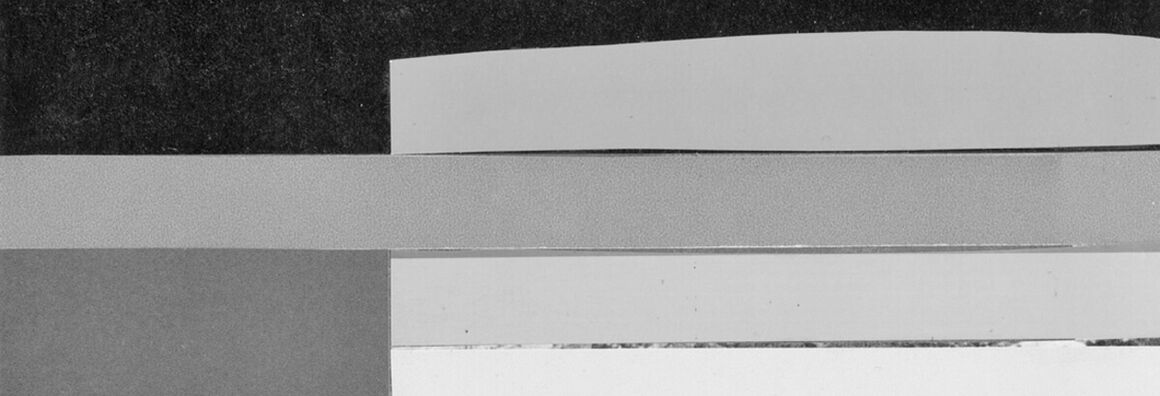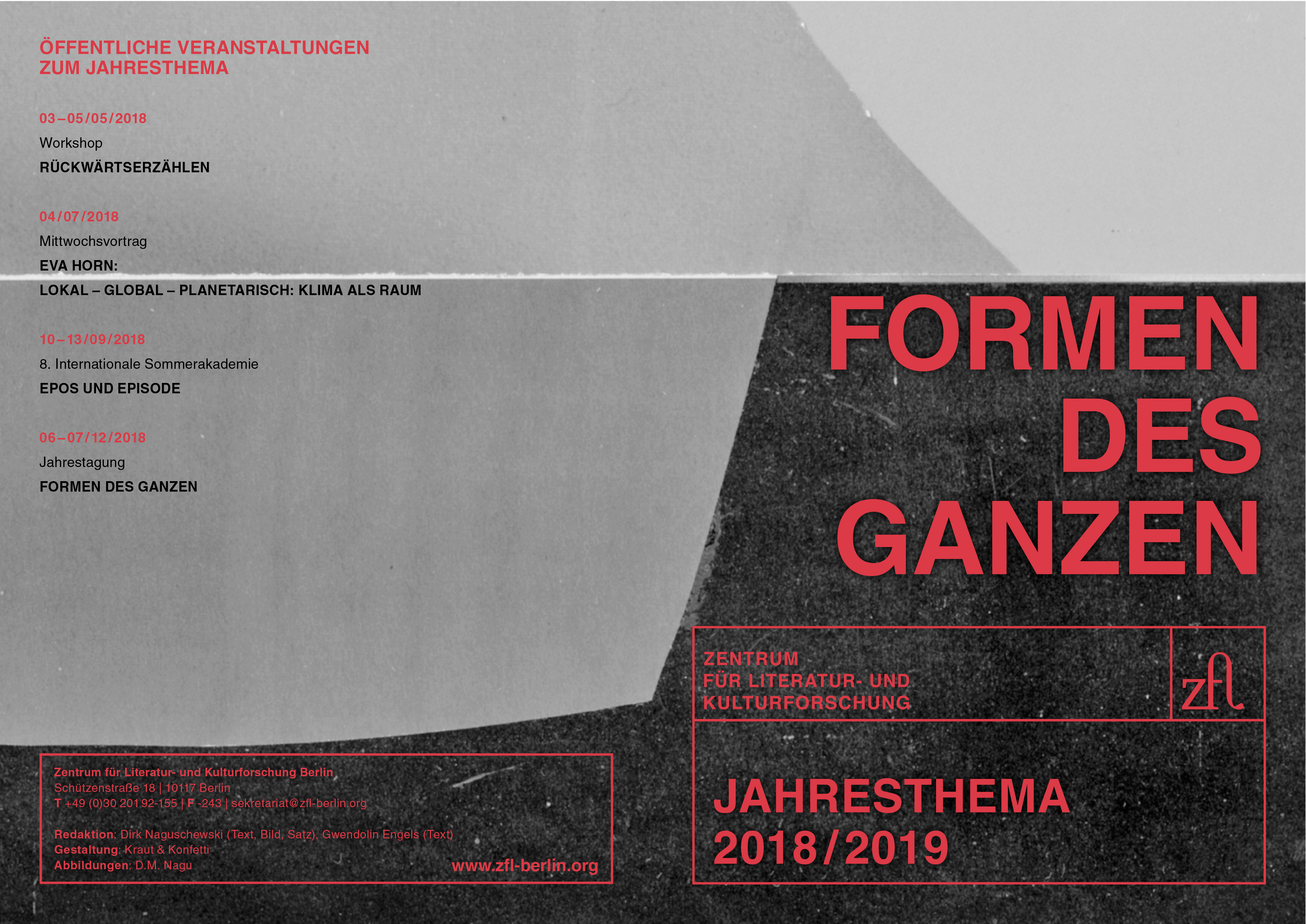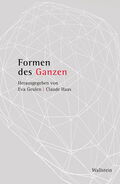
Annual Theme 2018/19: Forms of the Whole
This text is the short version of Eva Geulen: FORMEN DES GANZEN. ZfL-Jahresthema 2018/19, in: ZfL Blog, 10 Apr 2018.
The ZfL’s new annual theme somewhat inevitably ties in with the previous discussions on DIVERSITY in the fields of nature, culture, and the social. When dealing with diversity, it is impossible to avoid the question of the unity of diversity and, subsequently, the question of the whole. Thus, for example, the term biodiversity is a thoroughly inclusive concept and therefore a symbol for a whole. However, throughout the 20th century, holistic ideas were utilized by regimes which were named ‘totalitarian,’ and not by chance. For this reason also, today’s humanities are critical towards the whole. After all, that very spirit which was once meant to connect the humanities as sciences and distinguish them from the natural sciences is itself part of a group of unified terms which imply or assert a whole.
“The whole is the untrue.” This quote from Adorno’s Minima Moralia, which both follows and opposes Hegel, must be the most concise expression of the affect against the whole. But even Adorno does not dispense with the ambiguity: He who speaks of the whole has already betrayed the truth (of the specific and the particular). The quote also implies that the untruth is itself the whole.
However, there is plenty of reason to explore the whole in various contexts right now and urgently: within the discourse on globalization and global phenomena such as climate change or migration, the return of religion, the people, and the nation, in debates on universal values and rights, and in the favoring of ‘holistic’ approaches in medicine and psychology. In the development of theories, certain major terms which were believed to be suspended, terms such as capitalism, class, but also ontology have experienced great demand, and in the form of Big Data, the whole is virtually and digitally available. At the same time, ‘the whole’ bears many names: unity, totality, the absolute, but also life, spirit, process, or system. The whole is not only to be researched in its terms, metaphors, and their history, but also with regards to different modes of access and observation. This includes the sight in the Greek sense of theoria or in that of medieval mysticism, the concept of methexis, of participation in its pre- and post-platonic forms, various interpretations of integration, and translation (translatio imperii and translatio studii), scientific or technological determinism, the emergence of the ‘whole man’ in modern concepts of education, but also in esoteric sciences and political movements—often with totalitarian tendencies which aim at merging ‘the human’ with a greater whole.
After the collapse of the ancient concept of the cosmos, holistic terms began to multiply. In consequence, the modern human lost his privileged position within creation. However, it was precisely the Copernican Revolution which enabled him to subdue earth and space even more effectively than before. In this self-empowerment to subjugate the whole, Hannah Arendt saw the continued effect of modern times’ legacy in modernity, in “a truly ‘universal’ science […] which imports cosmic processes into nature even at the obvious risk of destroying her and, with her, man’s mastership over her,” as Arendt states in The Human Condition. This very development is apparent in the totalitarian regimes of the 20th century: According to Arendt, totalitarianism is present when political actions are taken in the name of a universal law of nature or history. She saw a relation between this ideology and the new form of state terror which claimed to enforce the law of nature or history.
Arendt’s reflection highlights just how important it is to ask for the forms in which a whole articulates itself and acquires a representation. Such FORMS OF THE WHOLE are at the center of our research on the topic: political, symbolic, epistemic, and, last but not least, literary forms. In this way, the ancient epic poem has always, and especially from a modern point of view, been viewed as an expression of wholeness and totality which is supposedly no longer possible in modernity. Epics, however—both modern and ancient—are characterized by redundancies, digressions, and leaps and therefore lack both unity and wholeness. On the other hand, smaller forms such as the example or the case history attempt to transcend their particularities in one way or another and to bring a whole into focus in the particular, the singular, or in the smallest.
For our historically broad and interdisciplinary work, the wholeness of the whole is not the point of reference. It is rather the diversity of its forms. The whole remains dependent on this diversity even when it returns and imposes itself as an irrefutable concept.
Fig. above: © D.M. Nagu
See also

Brochure [in German]:
ZfL ANNUAL THEME 2018/19:
FORMS OF THE WHOLE
Order your printed copy for free!
Contributions
- Editorial
Eva Geulen - Die Überdeterminierung des Ganzen
Siarhei Biareishyk - Casus und Wirklichkeit: “Lebens=Beschreibung” um 1730
Patrick Hohlweck - “Poetischer Polyp” – Zur Form des Epos
Elisa Ronzheimer
Publications
Formen des Ganzen
DOI 10.46500/83533990 (Open Access)
- Eva Axer, Werner Michler, Marjorie Levinson: Die “Neuen Formalismen” – Form, Geschichte, Gesellschaft. Drei Beiträge, in: ZfL Blog, 21 Jan 2019
- Siarhei Biareishyk: The Overdetermination of the Whole, in: ZfL Blog, 26 Nov 2018
- Eva Geulen: Über Raoul Schrotts “Erste Erde. Epos” (zum dritten Mal), in: ZfL Blog, 20 Aug 2018
- Georg Toepfer: Verzauberung der Welt durch Nachdichtung der Naturwissenschaft? Zu Raoul Schrotts “Erste Erde. Epos,” in: ZfL Blog, 9 Jul 2018
- Patrick Hohlweck: Casus und Wirklichkeit – “Lebens=Beschreibung” um 1730, in: ZfL Blog, 3 May 2018
- Elisa Ronzheimer: “Poetischer Polyp” – Zur Form des Epos, in: ZfL Blog, 23 Apr 2018
- Eva Geulen: Formen des Ganzen. ZfL-Jahresthema 2018/19, in: ZfL Blog, 10 Apr 2018
Events
Forms of the Whole
ZfL Berlin und ICI Berlin
Epic and Episode
ZfL, Schützenstr. 18, 10117 Berlin, 3. Et.
Eva Horn (Universität Wien): Lokal – global – planetarisch. Klima als Raum
ZfL, Schützenstr. 18, 10117 Berlin, 3. Et., Trajekte-Tagungsraum
Rückwärtserzählen
ZfL, Schützenstr. 18, 10117 Berlin, 3. Et., Trajekte-Tagungsraum
Media Response
Review by Philipp Stelzer, in: Arcadia 58.1 (2023), 126–134
